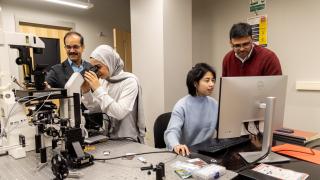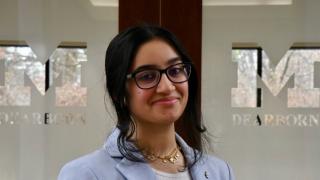
External Awards Received
The Office of Research is pleased to announce and would like to congratulate our Dearborn faculty members on receipt of the following external funding:
U-M Principal Investigator: Lei Chen
Project Title: Time-dependent Deep Learning Predictions of 3D Electrode Particle-resolved Microstructure
Sponsor: General Motors Company (dba General Motors Holdings, LLC)
Total Sponsor Authorized Amount: $58,057
Wide commercialization of Lithium-ion batteries (LIBs) for electric vehicles requires increasingly high energy density of LIBs which can be enhanced through optimizing the manufactured electrode microstructures. The goal of this project is to develop a deep learning (DL) model that is able to predict dynamic behaviors of electrode microstructure and optimize fabrication process parameters and microstructure design of electrodes. The application of the proposed model has the potential to significantly expedite microstructure design and optimize the manufacturing processes for battery porous electrodes.
U-M Principal Investigator: Alireza Mohammadi
Project Title: Engineering for One Planet (EOP) Institutionalization at the University of Michigan-Dearborn
Sponsor: Lemelson Foundation
Total Sponsor Authorized Amount: $197,883
The goal of this project is to maximize the impact of the Engineering for One Planet vision through a culture of integrating sustainability into engineering education by means of project-based learning (PBL) approaches applied to a wide range of engineering courses across all the UM-Dearborn engineering departments. By integrating sustainability into the curriculum of engineering courses at UM-Dearborn, the program will prepare students to be leaders in the effort to create a more sustainable future.
U-M Principal Investigator: Hugo Casquero
Project Title: Unstructured quadratic BEXT meshes
Sponsor: Honda Motor Co., Ltd
Total Sponsor Authorized Amount: $65,000
This project will investigate methods to achieve a seamless integration between the design and the analysis of thin-walled structures in industrial settings. Dr. Casquero’s team will develop quadratic splines with extraordinary points to achieve a seamless integration between computer-aided design (CAD) and finite-element analysis (FEA). Among other engineering applications, this research can be applied to the design, analysis, and optimization of the structural skeleton of vehicles, often called body in white, with the goal of maximizing the safety of vehicle’s occupants.
U-M Principal Investigator: Oleg Zikanov
Project Title: Center for Simulation of Plasma – Liquid Metal Interactions in Plasma Facing Components and Breeding Blankets of a Fusion Power Reactor
Sponsor: Oak Ridge National Laboratory
Total Sponsor Authorized Amount: $506,000
This project focuses on one of the key elements of the technology – the use of liquid metals, such as the Li-Pb alloy for shielding the reactor elements facing the plasma, energy conversion and producing tritium. In the reactor, the liquid metal will move under conditions of extreme electromagnetic and heating effects. A particularly challenging and, at the moment, entirely open question is how the metal will react the fluctuations of the electromagnetic forces caused by rapid (lasting milliseconds) fluctuations of the reactor plasma. In the absence of reliable experimental data, numerical simulations is the only way to predict this behavior and its implications to the reactor design. In the project, new computational models will be developed, tested, and applied to understand the behavior. The UM-Dearborn team will primarily work on numerical and semi-analytical solutions for idealized reactor components, which will serve as benchmarks for more comprehensive models designed by other teams. The solutions will also provide insight into the basic physics of the liquid metal’s response.
U-M Principal Investigator: Jaerock Kwon
Project Title: Development of machine learning algorithms for electric autonomous agricultural vehicles
Sponsor: WApplE Cloud Co., Ltd.
Total Sponsor Authorized Amount: $10,078
This project aims to develop a new and robust navigation framework using machine learning algorithms for autonomous agricultural robots. Using the proposed framework, the robots will be able to navigate agricultural environments, which are challenging for robots with conventional mapping and localization algorithms. The robot with the proposed robust machine learning-based navigation framework can be used to help farmers in various tasks such as spraying pesticide, picking fruits, and inspecting environments.
Announcements
Winter Cycle Competitive Campus Grants Applications Due February 15 by 5PM
The winter cycle of Competitive Campus Grants is now open for applications, with submission deadline Thursday, February 15th, 5:00 pm. The Competitive Campus Grants below are available to all UM-Dearborn tenured/tenure-track faculty.
- Research Initiation & Development (RID) Grants aim to assist faculty and research staff with the development of innovative, collaborative research proposals that will advance the UM-Dearborn mission. The program supports proposals which will help place the principal investigator (PI) and the research team in a strong position to receive additional, external funding from federal agencies, foundations, and/or industry.
Budget floor: $10,000; Budget ceiling: $20,000 - UM-Dearborn Scholars (SCH) Grants are intended to support research, scholarship and creative activities in the arts. This program is intended for projects with funding needs not usually addressed by other support programs within or outside the University.
Budget floor: $6,000; Budget ceiling: $10,000. - Thematic Research Planning (TRP) Grants are open to teams working closely together to solve problems that transcend the traditional boundaries associated with research programs, departments and colleges. Single PI proposals will *not* be considered- at least two different UM-Dearborn academic units should be involved, in addition to external partners. The aim of the program is to provide support for the development of competitive proposals to preliminary identified (by the team) external funding opportunities.
Budget floor: $15,000; Budget ceiling: $30,000.
More information about the campus grants programs including eligibility, previously funded projects and frequently asked questions can be found on our Campus Grants webpage. For additional questions, please email [email protected].
Bold Challenges Launches 2024 Themes & Events
The Bold Challenges Initiative will host its annual kickoff event February 20, 1-4 pm, to launch the 2024-2025 Boost application cycle and announce five new research themes that aim to address some of the world’s most critical issues. Bold Challenges’ 2024 themes range in scope from advancing human health at scale to creating sustainable energy innovations. The February event will feature lightning talks from U-M researchers, discussions on how to generate more competitive proposals and opportunities to network with representatives from multidisciplinary centers and institutes.
Throughout the winter semester, Bold Challenges also will host five workshops designed to foster engagement so that members of the U-M community can identify collaborators, share ideas and find new sources of support for interdisciplinary innovations. One of those sources includes Bold Challenges’ Boost program, which supports new and early-stage multidisciplinary teams whose ambitious, transdisciplinary projects have substantial potential for significant large-scale funding.
Faculty and staff should register for the upcoming kickoff and pollination events on the Bold Challenges website, where researchers also can learn about the 2024 Bold Challenges themes.
Upcoming Deadline for IRWG Grant Programs
Applications for two grant programs from the Institute for Research on Women & Gender are due February 7:
- Joan Schafer Research Faculty Award in Sport, Fitness, and Disability
Established in 2015, this program supports U-M faculty projects investigating how living with any type of disability influences access to, and participation in, sport and physical activity. Projects that have real world application through interventions in public health or clinic-based settings are a top funding priority. - IRWG Faculty Seed Grant: Open Topic
This grant program supports disciplinary and interdisciplinary faculty projects on women, gender, and sexuality. Funds may be requested for individual activities, such as research assistance, research-related travel, or research materials, or for collaborative projects, such as pilot studies. While providing funds for new and emerging work is a priority for this program, requests to add a gender component to an ongoing research project may also be considered.
Research Grants on Preventing & Alleviating Poverty
Poverty Solutions invites faculty at U-M's Ann Arbor, Dearborn, and Flint campuses to pursue research projects that can inform existing policies, practices, or interventions meant to prevent or reduce poverty or research that lays out proposals for future policy directions. Junior faculty are encouraged to apply, and partnerships with faculty across multiple campuses are strongly encouraged.
Poverty Solutions will award up to five grants of $20,000 each on a rolling basis; there is no set deadline to apply for the funding. See the RFP for guidelines and application instructions. Questions can be directed to [email protected].
NSF Mid-Career Advancement (MCA) Program
The NSF Mid-Career Advancement (MCA) program supports eligible mid-career scientists and engineers to substantively enhance and advance their research program and career trajectory. It provides support for protected time, resources, and the means to gain new skills through synergistic and mutually beneficial partnerships. The current application window is February 1, 2024 - March 1, 2024; proposals will be accepted each February 1 - March 1 annually thereafter.
MCA program synopsis: “The MCA offers an opportunity for scientists and engineers at the mid-career stage to substantively enhance and advance their research program and career trajectory. MCA support is expected to help lift constraints to reduce workload inequities and enable a more diverse scientific workforce (more women, persons with disabilities, and individuals from groups that have been underrepresented) at high academic ranks.
Participating programs in the Directorates for Biological Sciences (BIO), Geosciences (GEO), Social, Behavioral and Economic Sciences (SBE), Education and Human Resources (EHR), and Technology, Innovation and Partnerships (TIP) will accept MCA proposals. To help identify the disciplinary program in which the MCA should be reviewed, PIs are urged to investigate the research areas supported by the different directorates and participating programs. View the NSF MCA Contact list.
Read about the three key objectives of the solicitation, plus tips for successful proposals in the NSF 101 for the Mid-Career Advancement program. As a reminder, there are also many Research Development resources available through the Office of Research when preparing a proposal.
Mardigian Library Support for Data Management Plans
Data management plan support available from the UM-Dearborn Mardigian Library. Data management planning is often required by funders in the form of a document called a Data Management Plan (DMP) that will describe the handling (collection, storage and archiving) of data collected during your project. A DMP may also need to include plans for the dissemination of your data, (sometimes referred to separately as a Data Sharing Plan). To help faculty navigate data management planning, the UM-Dearborn Mardigian Library offers both a subject guide on Research Data Management as well as a DMP review service.
The UM-Dearborn Mardigian Library’s Research Data Management subject guide covers definitions, online tools for creating a DMP, guidance from ICPSR, example plans and more. Read the Research Data Management subject guide to learn more about DMPs.
UM-Dearborn librarians are also available to help answer questions and offer support to faculty improving their DMPs as a part of their DMP review service. To contact a librarian for a DMP review, fill in their DMP review request form.
Reminder: Resources for Using SciENcv
Effective October 23, 2023 NSF requires all biosketch and current & pending support documents for senior personnel to be prepared using SciENcv. The fillable pdf forms are no longer accepted. We recommend that you take the time to register with ScieENcv and begin to create your documents in that system if you expect to be involved in a proposal to NSF in the near future.
U-M Library Services has put together this guidance page to help you get started. You can also request a one-on-one Zoom session with Dearborn Office of Research staff to walk you through this process. Science Experts Network Curriculum Vitae (SciENcv) is a researcher profile system for all individuals who apply for, receive or are associated with research investments from federal agencies. SciENcv allows researchers to document their education, employment, research activities, publications, honors, research grants, & other professional contributions to create multiple SciENcv profiles in official biographical sketch formats funding agencies such as the National Institutes of Health (NIH), the National Science Foundation (NSF), and the Institute of Education Sciences (IES). In addition, the SciENcv application can be used to create the official NSF Current and Pending Support document.
Any researcher can register for SciENcv and create multiple biosketches, for different research projects or different funding agencies. You can find much more information about how to use SciENcv on their FAQs page. The central Office of Research and Sponsored Programs and U-M Library have resources and previous workshops available on how to create a biosketch in SciENcv specifically focused on NSF and NIH. These resources are available linked below:
- U-M Library SciENcv Guide (including step-by-steps for creating NSF and NIH biosketches)
- NSF Biosketch and SciENcv Webinar (July 2020)
- Slide Deck (MLibrary Presentation)
- NSF Biosketch Webinar Transcript
- How to Create Your NSF Biosketch in SciENcv Step-by-step (MLibrary Handout)
- NIH Biosketch and SciENcv Webinar (May 2020)
- Slide Deck (MLibrary Presentation)
- NIH Biosketch Webinar Transcript
- Biosketch and SciENcv Step-by-Step (MLibrary Handout)
If you have questions about SciENcv, need additional support, or would like to schedule one-on-one assistance with setting up your SciENcv profile and documents, please email our office at [email protected].
Research Events in February
- Mardigian Library, “Funding Databases” - Tuesday, February 6th, 10 - 11AM, virtual
- OVPR-PERI, “Public Engagement For Anti-Racism Scholarship Workshops,” virtual
- Workshop #1: Introduction to Publics and Public Engagement - Friday, February 16, from 10 - 11:30AM
- Workshop #2: Assessing Impacts - Friday, March 8, 10 - 11:30AM
- Hanover Research, “Writing Your Data Management Plan” - Thursday, February 29th, 12 - 12:45PM, virtual
The Office of Research website is also updated regularly with research-related events and announcements, so we would encourage you to bookmark our landing page and subscribe to our Research News email list.
Research Resource Highlight: Mardigian Library Faculty Research Guide
Every month, the Office of Research features a resource and/or tool that is available for researchers. This month we are featuring the Mardigian Library Faculty Research Guide. Visit the Guide webpage to access information on Data Management and Dissemination Plans and a link to the library DMP service, to find advice on where to publish your research and how to track citations, access citation tools and more! The Office of Research and the Mardigian Library teams are actively working together to identify research-related needs and address them.
Upcoming Funding Opportunities
The Office of Research publishes a list of selected funding opportunities, organized by college, every month on our website under Announcements. In addition, yearly grant calendars organized by subject area provided by Hanover Research are available there as well.
Use the updated U-M Research Commons to look up internal (to U-M) funding opportunities and Limited Submission opportunities open to Dearborn researchers.
Contact the UM-Dearborn Office of Research if you would like more information about submitting a proposal to any of the programs.



